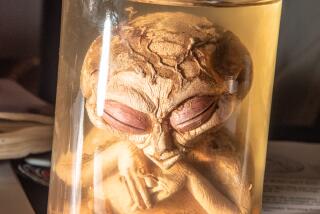The curious thing about Alan Alda
- Share via
For a new three-part PBS special called “The Human Spark,” actor and science lover Alan Alda visits a number of far-flung places -- Germany, a Caribbean island, the home of the Lascaux cave paintings -- in pursuit of just what it is that makes us different from the Earth’s other creatures.
But his scariest moment came from somewhere closer to home: his own mind.
For the program’s final chapter, on the human brain, Alda was getting an MRI to get a clearer sense of the way the mind works. He’d been through this kind of imaging at least a dozen times, on the many science programs he’s hosted, but this time the staff forgot to give him the bulb patients squeeze in case of a panic attack. Despite his long experience, he found himself spiraling downward.
“It really is like being in a coffin,” said Alda, 73, with a self-mocking laugh. “I was yelling, but they couldn’t hear me, because they were in another room. So I started waving my legs, but they were shooting in another direction, so they weren’t looking at me. Finally somebody said, ‘Why is he waving his legs?’ ”
Most of the rest of Alda’s excursion into the big questions of human existence had more peaceful resolutions: Despite gorillas that lunged at him and a Duke University scientist, for instance, he came out of that North Carolina visit unscathed. And he walked away, in one piece, from several simulations of spear-making and elephant hunting.
Jared Ipworth, executive producer for “The Human Spark,” which airs tonight and the next two Wednesdays, calls Alda a perfect fit for the show’s approach. “His immense curiosity about science and his ability to get scientists to speak about the ways their field relates to others” was crucial to making it work.
Most of the issues in the program -- the diversion of humans from chimpanzees 6 million years ago, the gradual replacement of Neanderthals by modern humans, development of young children -- had been covered in other places, Ipworth said, but not brought together properly.
That’s not always easy, he said. “Especially with scientists who are also professors, when you put them into a documentary setting, they revert to lecture-speak.” Alda, he says, opens them up. “Alan never claims to be an expert, he’s just a very interested observer.”
Alda sums up the show this way: “We’re trying to figure out by asking a wide range of scientists -- and there are different opinions on this -- what makes us different from the other animals? And what made us that way?”
Alda’s fascination with science is, by this point, no secret. From the age of 10 or so he was what he calls an amateur inventor. “I would build things out of scrap metal. And even before that, I was curious: I would mix things together, do experiments, see what would happen.”
He was in college when writer C.P. Snow wrote his influential essay “The Two Cultures,” about the two different languages spoken by people in the sciences and the humanities. “I didn’t know about it at the time,” recalled Alda, “but I was in the thrall of it. I believed what was the common thinking of the time, that if you were interested in art you couldn’t be interested in science. So I stepped away from something that had been a long interest of mine, and didn’t come back until I was in my early 20s.”
That passion continued behind the scenes while he portrayed Hawkeye Pierce on “MASH.” From 1993 to 2005 he hosted “Scientific American Frontiers” on PBS, and he starred in “QED,” the 2001 play -- originated at the Mark Taper Forum -- on prankish CalTech physicist Richard Feynman.
Alda was chosen to lead “The Human Spark” by Graham Chedd, who directed the actor in “Frontiers.” The program tries to cover a lot of ground in three episodes -- which are titled “Becoming Us,” “So Human, So Chimp,” and “Brain Matters” -- but the issue is profound and constantly growing and changing. The show was completed, for instance, before last summer’s reports of the discovery of bone and ivory flutes from 35,000 years ago, the earliest known musical instruments.
In fact, at least one annual science festival is dedicated to the question of what makes us human. “But it will never wear out,” Alda says. “Because people are fascinated about where we come from.”
Though the show ends on a counterintuitive note, most of its conclusions about what makes us human are pretty familiar: Tool use, language and symbols, social sensitivity, and so on. “The Human Spark,” then, is very much about the journey to knowledge and understanding, and, for Alda, about curiosity itself.
Alda, who has declined to discuss his own political views for most of the last quarter-century, bristles a little when asked if science has become the cause that anti-militarism and the Equal Rights Amendment once were for him.
“The funny thing is, once you’re famous, whatever you do becomes your cause,” he says. “If you take drugs, that’s your cause. If you get divorced, that’s your cause.
“But it’s just something I’m very interested in, and when I do something about it, it tends to be in public. I have a personal response to science -- I love science -- and I want it to be available to more ordinary people.”


